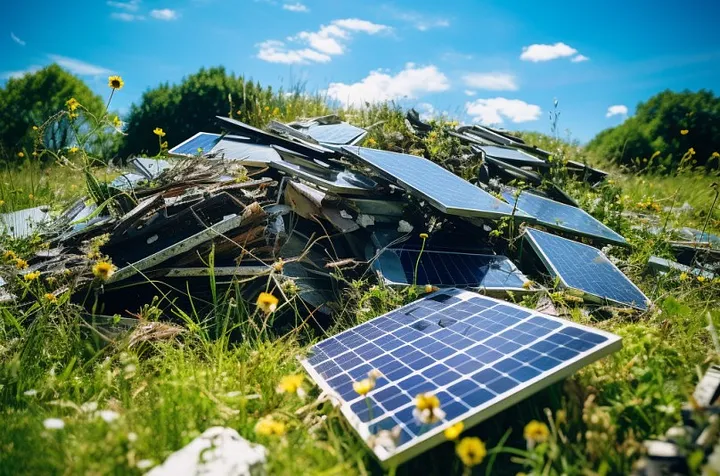
As the world shifts towards renewable energy, solar panels have become a popular choice for both residential and commercial properties. Solar panels have a long lifespan, typically around 25-30 years, but eventually, they need to be replaced. Proper disposal of solar panels is crucial to prevent environmental harm and to recover valuable materials. In this blog, we’ll explore the responsible ways to dispose of solar panels, highlighting best practices, recycling processes, and the environmental benefits of proper disposal.
The Importance of Responsible Disposal
Solar panels are composed of various materials, including glass, aluminum, silicon, and small amounts of hazardous substances like cadmium and lead. Improper disposal can lead to these hazardous materials leaching into the soil and water, causing environmental and health problems. Additionally, the sheer volume of solar panels being decommissioned poses a significant waste management challenge.
Responsible disposal of solar panels not only mitigates these risks but also allows for the recovery and reuse of valuable materials. Recycling reduces the need for raw materials, conserves energy, and reduces greenhouse gas emissions associated with mining and processing new materials.
Steps for Responsible Disposal
Identify the Type of Solar Panel:
- Silicon-based panels: These are the most common and include monocrystalline and polycrystalline panels.
- Thin-film panels: These include cadmium telluride (CdTe), copper indium gallium selenide (CIGS), and amorphous silicon panels.
Check Warranty and Manufacturer Take-Back Programs: Many solar panel manufacturers offer take-back programs where they will accept old panels for recycling. This is often the easiest and most responsible option as manufacturers have established processes for recycling.
Find a Certified E-Waste Recycler: If the manufacturer does not offer a take-back program, look for a certified e-waste recycler. The recycler should follow environmentally sound practices and be certified by organizations such as e-Stewards or R2 (Responsible Recycling).
Transportation and Handling: When transporting solar panels to a recycling facility, ensure they are handled carefully to prevent damage and breakage. Damaged panels can release hazardous materials, making disposal more challenging.
Recycling Process: The recycling process varies depending on the type of solar panel:
- Silicon-based panels: The glass is removed and cleaned, and the aluminum frame is separated. Silicon cells are chemically treated to remove impurities and can be reused to produce new solar panels.
- Thin-film panels: These panels are shredded, and the resulting mixture is treated with chemical baths to separate the different materials, which can then be reused.
Benefits of Solar Panel Recycling
Environmental Protection: Proper recycling prevents hazardous materials from contaminating the environment. It ensures that substances like lead and cadmium are safely managed and disposed of.
Resource Recovery: Solar panels contain valuable materials such as silicon, silver, and aluminum. Recycling recovers these materials, reducing the need for mining and processing new raw materials.
Energy Conservation: Recycling uses less energy compared to extracting and processing new materials. For example, recycling aluminum saves up to 95% of the energy required to produce new aluminum from bauxite ore.
Economic Benefits: The recycling industry creates jobs and supports the economy. As the volume of decommissioned solar panels increases, so does the demand for recycling services and technologies.
Challenges in Solar Panel Recycling
Volume and Capacity: The sheer number of solar panels reaching the end of their life presents a challenge. Recycling facilities need to scale up their capacity to handle the increasing volume.
Economic Viability: The cost of recycling solar panels can be higher than landfilling them, especially if the panels are damaged or contain rare materials that are difficult to separate. Developing cost-effective recycling technologies is crucial.
Regulatory Framework: Regulations for solar panel disposal vary by region. A standardized regulatory framework would help ensure consistent and responsible disposal practices worldwide.
Public Awareness: Many consumers are unaware of the proper disposal methods for solar panels. Public education campaigns are needed to inform and encourage responsible disposal practices.
Innovations in Solar Panel Recycling
Advancements in Recycling Technologies: Researchers are developing new technologies to improve the efficiency and effectiveness of solar panel recycling. For example, thermal and chemical treatments can more effectively separate valuable materials from the panels.
Extended Producer Responsibility (EPR): EPR policies require manufacturers to take responsibility for the entire lifecycle of their products, including end-of-life disposal. Implementing EPR for solar panels can drive innovation in recycling technologies and reduce the environmental impact of solar energy.
Design for Recycling: Designing solar panels with end-of-life recycling in mind can make the recycling process easier and more efficient. This includes using materials that are easier to separate and recycle and reducing the use of hazardous substances.
Case Studies
Europe’s WEEE Directive: The Waste Electrical and Electronic Equipment (WEEE) Directive in Europe includes solar panels in its scope. It requires manufacturers to finance the collection, treatment, and recycling of end-of-life panels, resulting in higher recycling rates and reduced environmental impact.
First Solar’s Recycling Program: First Solar, a leading solar panel manufacturer, has implemented a robust recycling program. The company’s recycling process recovers up to 95% of semiconductor materials and glass from its thin-film panels, setting a high standard for the industry.
PV CYCLE: PV CYCLE is a non-profit organization that offers waste management services for end-of-life solar panels across Europe. It provides collection and recycling services, ensuring that valuable materials are recovered and hazardous substances are safely managed.
The Future of Solar Panel Disposal
The future of solar panel disposal lies in developing sustainable and efficient recycling processes, implementing regulatory frameworks that promote responsible disposal, and increasing public awareness about the importance of recycling. Collaboration between manufacturers, recyclers, policymakers, and consumers is essential to create a circular economy for solar panels, where materials are continually reused and waste is minimized.
Conclusion
As the solar industry continues to grow, so does the need for responsible disposal of solar panels. Proper recycling not only protects the environment but also recovers valuable materials and conserves energy. By following best practices, supporting innovative recycling technologies, and implementing effective policies, we can ensure that solar energy remains a sustainable and environmentally friendly solution for the future.
